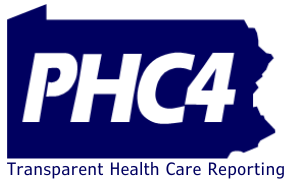News for Immediate Release
March 27, 2025
Harrisburg – PHC4 publicly released the Cancer Surgery Volume Report today, giving stakeholders in Pennsylvania valuable insight into cancer surgeries performed at hospitals and ambulatory/outpatient settings.
The types of cancer surgery included in the report are bladder, brain, breast, colon, esophagus, liver, lung, pancreas, prostate, rectum, and stomach. Within the Cancer Surgery Volume Report, one will find hospital-specific results for all 11 cancer types. Surgeries performed in ambulatory surgery centers and hospital outpatient departments are included for cancers of the bladder, breast, and prostate. The data included is from July 1, 2023, through June 30, 2024 (state fiscal year 2024).
The report displays the percentage of cancer surgeries performed over the past six years in Pennsylvania facilities. The findings report that the percentage of prostate cancer surgeries performed in the outpatient setting (hospital outpatient departments and ambulatory surgery centers) increased from 25% in state fiscal year 2019 to 64% in state fiscal year 2024. The percentage of breast cancer surgeries performed in the outpatient setting (hospital outpatient departments and ambulatory surgery centers) also increased from 87% to 94%. The total volume of cancer surgeries performed over the past six years, across these 11 types, has increased by 7% overall.
“This information can be helpful to cancer patients, families, and caregivers, as well as stakeholders across the Commonwealth in making informed decisions about cancer surgical care.” said Barry D. Buckingham, PHC4’s Executive Director. Buckingham went on to say that PHC4’s goals include providing fact-based reporting in support of those charged with prioritizing health care resources effectively.
PHC4 is an independent council formed under Pennsylvania statute (Act 89 of 1986, as amended by Act 15 of 2020) in order to address rapidly growing health care costs. PHC4 continues to produce comparative information about the most efficient and effective health care to individual consumers and group purchasers of health services. In addition, PHC4 produces information used to identify opportunities to contain costs and improve the quality of care delivered.
For more information, visit phc4.org or review the full report here.
Media contact:
Barry D. Buckingham, Executive Director, PHC4
bbuckingham@phc4.org

